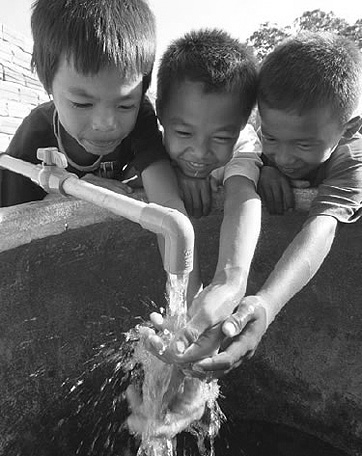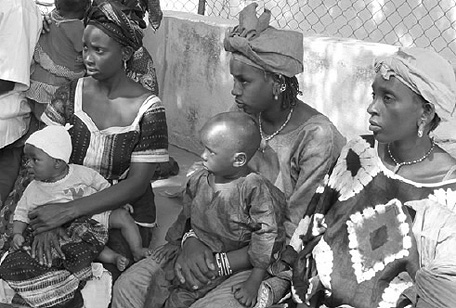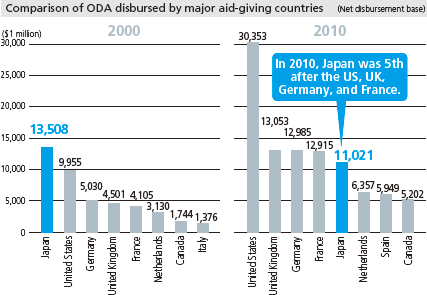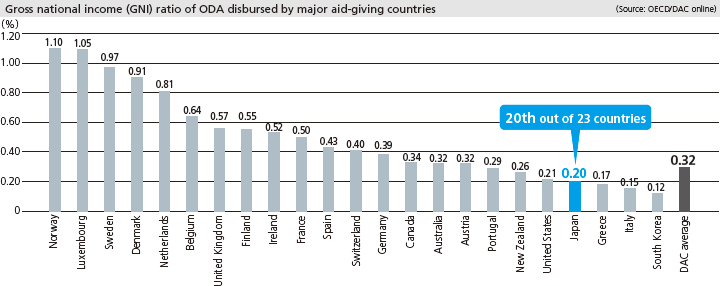Japan's Official Development Assistance White Paper 2011
ODA Fast Facts
ODA: Why Now?
Assistance helps developing countries that face a variety of difficulties that accompany development, and is used to solve problems that affect the whole world, such as environmental issues and infectious diseases, but providing assistance helps Japan itself as well. However, some wonder why it is necessary for Japan to provide official development assistance (ODA) in the midst of working to recover from the Great East Japan Earthquake. We would like to answer your questions related to such discussions, including providing a description of the current state of Japan’s ODA in the world.
1. Japan has suffered an earthquake, so why is it necessary to provide ODA now?
Aren't there things that should be done domestically rather than providing ODA?
At the time of the Great East Japan Earthquake, Japan received offers of assistance from 163 countries and regions around the world, including developing countries. This gave us the experience of standing in the shoes of those who receive aid. This gave us a renewed sense that Japan lives in the midst of relationships with the countries of the world. Mutual help between fellow members of the international community that are experiencing difficulties is important to maintain the position as a trusted country as well. It will be impossible to solve the conflicts and problems related to development faced by developing countries, such as poverty, disease, and access to clean water, unless all countries of the world, including the developed countries, consolidate their efforts.
In addition, if Japan sits back and does nothing with the belief that infectious diseases and global warming are the problems of other countries and regions, there are problems that will adversely affect Japan and the rest of the world. It is necessary for Japan to work to resolve such global issues as a member of the international community.
Further, considering its interdependent relationship with the countries of the world, ODA has significant power as a method of pushing economic growth not only in developing countries, but in Japan as well, while deepening its economic relationship with developing countries that are experiencing tremendous economic growth. For example, if ports and transportation routes, etc., are established through ODA, it will be easier for Japanese companies to enter those regions, trade with Japan will increase, and there will be more opportunities for Japan's business. At the same time, it is important to consider things in the long term, not just issues that are immediately in front of us. For example, aid to the countries of Africa does not necessarily lead directly to Japan's national interests. However, if that region becomes stable and its people can live without anxiety, it may lead to a level of economic growth that enables the people to buy Japanese products. Distributing vaccines and conducting other activities to improve sanitary conditions and foster the health of children may result in a valuable labor force for Japanese companies that enter the region. Supporting the peace and economic development of developing countries is useful in protecting the security and prosperity of Japan. Considering these things, the importance of ODA, which ties Japan and developing countries together, should be clear.

Children gathered around a newly built water spout in Phnom Penh, Cambodia (Photo: Kenshiro Imamura/JICA)

Mothers and children waiting for medical examinations (Photo: Raymond Wilkinson/JICA)
2. Where does the amount of Japan's current assistance to developing countries rank in the world?
In 2010, Japan provided approximately $11 billion in official development assistance (ODA) (net disbursements). This ranks in fifth place, behind the US, UK, Germany, and France. In the 1990s (1991 to 2000), Japan was the world's leading donor, but subsequent severe economic conditions resulted in a gradual decrease. (Graph to the bottom)

Although Japan is fifth in the world in monetary amount, Japan is twentieth out of the 23 DAC (OECD Development Assistance Committee; a group of major donor countries) member counties in terms of the gross national income (GNI) ratio, which is an indicator of the degree of contribution in relation to the economic scale of the nation. (Japan’s ratio is 0.20%. See the graph below for details.) Only three countries are ranked lower than Japan: Greece, Italy, and the Republic of Korea. The shared target for developed countries as determined by the United Nations is a GNI ratio of 0.7%. Considering Japan's economic strength and standing in the international community, there are greater expectations for assistance from Japan.

3. Japan is not the only country experiencing severe economic conditions.
What approaches are other countries in the developed world taking in regard to ODA?
There are countries that are increasing ODA in spite of severe economic conditions. For example, the UK increased ODA by 20% in 2010, even as the government worked to reduce expenditures. France is also facing difficult financial circumstances, but tends to increase ODA. Germany has also increased disbursements, and Australia doubled its ODA over the five years from 2005 to 2010. The ROK became an official member of the DAC in 2010, and has established a target of increasing its aid amount-GNI ratio from the 2009 level of 0.1% to 0.25% by 2015.
In the background of an increase of assistance from these countries in the midst of severe economic circumstances is the high level of concern of the people of Europe, the US, and many other countries toward developing countries, in particular those facing severe poverty, and the corresponding broad and powerful support of the people for ODA. The reason that the developed world does not decrease ODA seems to be the prevalent recognition that the peace, stability, and development of developing countries leads to the stability and prosperity of developed world. In addition to being an international responsibility, ODA is implemented by each of these countries with the view that it is an important method of diplomacy. In addition, recently, assistance is sometimes viewed as being helpful in improving the country's image, etc.
